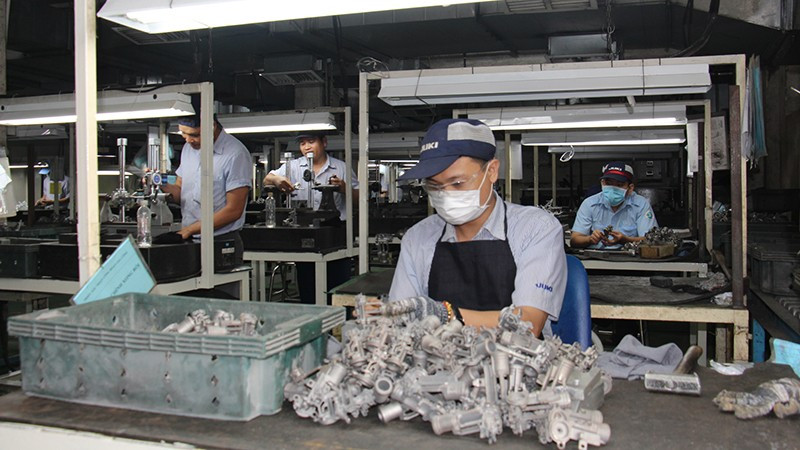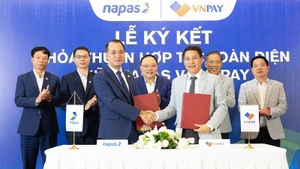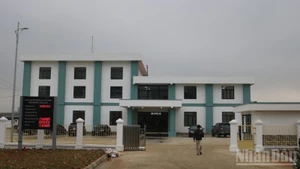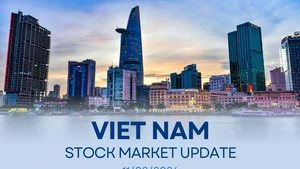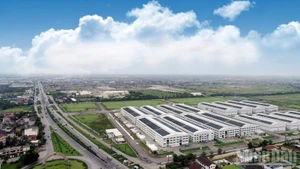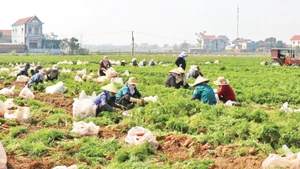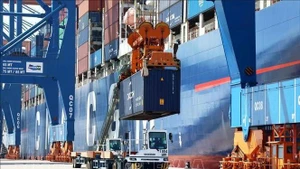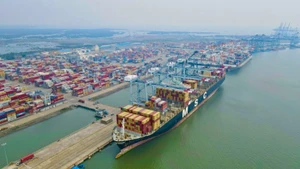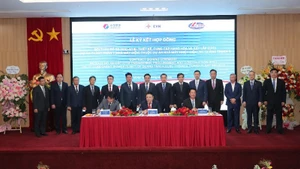According to experts, restructuring Ho Chi Minh City’s industry towards high technology, modern machinery, and the application of the achievements of the industrial revolution 4.0 is an urgent need in order to improve the productivity and competitiveness of the industry.
Enhancing competitiveness from technological innovation
Factories 1 and 2 of Juki Vietnam Co., Ltd., based in Tan Thuan Export Processing Zone in District 7, Ho Chi Minh City have focused on innovating production lines towards automation in recent years. The factories have put many advanced robots into production stages that require high precision, helping to reduce their labour force.
Juki factories have doubled their productivity, from 500 products to 1,000 products per day when using robots. The factories only need one worker to support the robots instead of three or four workers as before. Juki Vietnam Co., Ltd is under the Japanese Juki Corporation - a leading industrial sewing machine manufacturer in the world.
The corporation is running four factories in Ho Chi Minh City and is expected to open a new factory also in Tan Thuan Export Processing Zone in the near future.
Permanent Director of Juki Vietnam Co., Ltd. Dao Quoc Cuong said that the Juki Corporation has established an automation and robotics division, focusing on factories in Vietnam to increase labour productivity and reduce its dependence on workers. The promotion of automation in the assembly line of industrial and home sewing machines are two key areas of Juki.
In addition, the company also expands assembly for the automobile and other machinery and equipment industries. It expects to increase productivity by an average of 10% per year.
As a company specialising in manufacturing CNC machines (computer numerical control machines), Hiep Phat Mechatronics Co., Ltd based in Hoc Mon district, Ho Chi Minh City focuses on applying scientific and technological advances to creating new products and services.
Hiep Phat has gradually asserted its position in the market by providing the design, manufacturing and supply of robots, CNC machines and their components for partners, including partners in Ho Chi Minh City Hi-Tech Park.
Director of Hiep Phat Mechatronics Co., Ltd Bui Thanh Luan said that automation technology has made the factory smarter with faster production management and timely problem solving. In addition, product quality has increasingly improved while costs and the number of workers have been reduced in addition to decreases in energy consumption and defective products.
Finding ways for industrial model innovation
According to the Ho Chi Minh City Institute for Development Studies, Ho Chi Minh City’s industry grew by an average of 5.87% per year in the 2011-2015 period, while the nation’s industry rose by an average of 7.39%. In the 2016-2021 period, the industry of the city expanded by 2.67% per year while the nation’s industry soared by 6.8% per year.
During the 2011-2021 period, the city’s industry only grew by 4.11% per year while the industry of the whole country went up by over 7% per year. Particularly in 2021, the city’s industry fell deeply, while the nation’s industry surged by 4.47% per year.
The city’s industry accounted for 15.38% of the added value of national industry in 2010, but it only accounted for 8.7% in 2022. The gradual reduction shows that the city does not have many resources for industrial development, especially land.
In addition, the city advocates to limit the attraction of projects in unskilled labour intensive industries and promote the shift of industrial production projects to outside the city, which has also reduced the proportion of the city’s industry compared to that of the whole country.
The number of enterprises applying technology to industrial production nationwide and in Ho Chi Minh City is still limited. According to a recent study, more than 50% of surveyed enterprises say they understand about the industrial revolution 4.0, but have no initial idea about the strategy. Meanwhile, the number of enterprises building a strategy accounts for less than 2% and the number of enterprises who are implementing a strategy accounts for less than 5% of the total number of surveyed enterprises.
The number of enterprises applying technologies to production accounts for a relatively low proportion of the total number of surveyed enterprises, less than 3% of the total number of surveyed enterprises in both Ho Chi Minh City and the whole country.
Professor, Dr. Nguyen Trong Hoai from Ho Chi Minh City University of Economics said that the city’s industrial development has reached the post-industrial stage. This means that this stage is dominated by the efficiency of the service sector which will make the proportion of industry stagnate. The city’s industrial base is interspersed in the urban area, which has also affected the quality of life and living environment due to industrial pollution, leading to infrastructure congestion.
With the above limitations, enterprises in industrial zones must transform their technology, which requires their commitment to a roadmap as well as support from the city authorities. If enterprises do not meet the criteria for technological transformation or environmental protection, their projects will not be renewed by the city authorities.
For industrial zones with available space for development, the city encourages enterprises with high technology levels.
According to Dr. Huynh Thanh Dien from Nguyen Tat Thanh University, Ho Chi Minh City should determine the stage to focus on in the value chain of each priority industry. In particular, the city should undertake the research of technology solutions, design and production of supporting industrial products that require high technology to join the global supply chain.
“In the medium and long term, Ho Chi Minh City is required to transform its industrial zones and enterprises based there towards a greener and better technology approach,” said Professor, Dr. Nguyen Trong Hoai.
